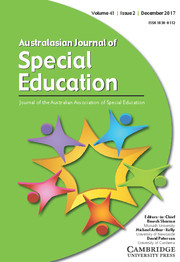No CrossRef data available.
Article contents
Does What Works Clearinghouse Work? A Brief Review of Fast ForWord®
Published online by Cambridge University Press: 26 February 2016
Abstract
The What Works Clearinghouse (WWC) provides online reports to the public about the scientific evidence for educational interventions. The quality of these reports is important because they effectively tell the non‐scientific community which programmes do and do not work. The aim of this brief review is to assess WWC’s report on a clinically popular, yet theoretically controversial, intervention called Fast ForWord® (FFW). Some of the methods used by WWC to assess FFW were problematic: the literature review included studies that had not passed peer review; it failed to include a key study that had passed peer review; alphabetic skills were assessed with phonological awareness outcomes; effectiveness ratings were based on statistical significance; terms peculiar to WWC were not clearly defined; and existing quality control procedures failed to detect an error in the WWC report. These problems could be addressed by making minor adjustments to WWC’s existing methods and by subjecting WWC reports to the scientific peer‐review process before they are released to the public.
- Type
- Research Article
- Information
- Australasian Journal of Special Education , Volume 32 , Issue 1: A Scientific Approach to Special Education , April 2008 , pp. 101 - 107
- Copyright
- Copyright © The Australian Association of Special Education 2008


